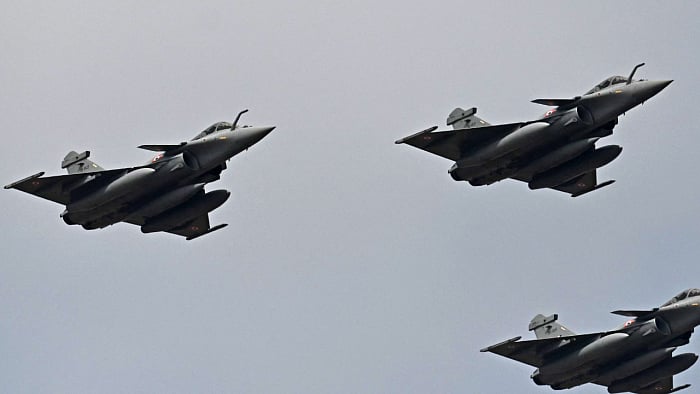
A judicial probe has been ordered in France into the corruption surrounding the Rafale fighter jet deal with India. In India, the Supreme Court and the Comptroller and Auditor General have already given a clean chit to the Narendra Modi government in the deal.
The Parquet National Financier (PNF) responsible for tracking down complex economic and financial crimes in France has referred the case to a Judge Investigator (juge d’instruction). The French Judge Investigator has sweeping powers to summon witnesses, seize evidence, freeze assets and even order wiretaps. If a money trail is established, the political fallout could be far-reaching.
The Judge Investigator is an institution unique to France and a few other European countries. Complex economic crimes are referred to the independent and powerful Judge Investigators. Such references are rare - in 2000, only seven per cent and in 2010, only four per cent of criminal investigations were carried out by Judge Investigators.
The PNF took note of a complaint by an anti-corruption NGO, Sherpa, alleging corruption, favouritism, influence-pedalling, money-laundering and undue tax waivers in the Rafale deal. The complaint was based on investigative reports by the news portal Mediapart.
An earlier complaint was dismissed by the then head of PNF, Elain Houlette, for “preserving the interests of France”. However, Houlette’s successor Jean-François Bohnert decided to refer the case to a Judge Investigator based on an updated complaint, including further revelations by Mediapart.
Most Indians found it difficult to understand why the Modi government had overnight agreed to pay Rs 58,000 crore for just 36 Rafale jets when the previous government had negotiated Rs 54,000 crore for 126 jets. Or, why an Indian company with no experience in aeronautical manufacturing belonging to a businessman in dire financial difficulties (who has since declared bankruptcy) was forced on the manufacturer of Rafale, Dassault, as its Indian partner to receive up to 50 per cent of the cost of contract as an investment (off-set) in India.
The Judge Investigator will examine the role of former French president Francoise Hollande, of the then finance minister and current French President Emmanuel Macron and the then defence minister Jean Yves Le Drian, now Foreign Minister. He is also likely to scrutinise whether Dassault chose to partner with Anil Ambani to buy political influence. Hollande, in an interview, revealed that the Indian off-set partner of Dassault was appointed at the behest of India. Dassault, however, denies this.
Suspicions have also been raised at Reliance Entertainment funding (Euro 1.6 million), a film co-produced by President Hollande’s partner, actress Julie Gayet barely months prior to the Rafale deal. Macron is accused of waiving Euro 143 million in tax for the French subsidiary of Anil Ambani group.
Ambani, Mediapart reports suggest, had prior knowledge of the new Rafale deal for 36 aircraft overruling previous negotiations. In fact, he signed his first Memorandum of Understanding with Dassault on March 26, 2015, two weeks before the deal was inked. Mediapart also revealed that in 2017, Ambani and Dassault created a joint venture called Dassault Reliance Aerospace Limited (DRAL) in which Dassault agreed to pay Euro 159 million for 49 per cent equity while Ambani would pay only Euros 10 million for the majority equity stake of 51 per cent. Apparently more than the investment, Dassault valued the political influence that Ambani brought to the table.
In France, investigations of scandals of the outgoing regime are common. President Jacques Chirac faced trial after retirement and received a two year suspended sentence for misusing public money as Mayor of Paris. This year, former President Nicholas Sarkozy received a partially suspended jail sentence of three years for influence-peddling.
Opposition parties in India will have to take the lead from the French investigation to hold the government accountable. That the government on its own is not going to oblige them is evident. The Enforcement Directorate recovered evidence from arms dealer Sushen Gupta arrested in March 2019 in the Augusta Westland chopper deal. It showed that he had received kickbacks in “other defence deals”. Gupta, an agent for Dassault, had quite presciently provided information to Dassault of the Modi government’s intention to buy 36 aircraft for Euros 7.8 billion in January 2019 itself. The ED charge-sheet in AugustaWestland, ignored these facts saying they were “not a subject matter of the present investigation”.
In the wake of the French investigation, the CPI (M) and the Congress have demanded a probe by a Joint Parliamentary Committee (JPC). The demand may gain momentum in the Monsoon session of Parliament. Experience of the Bofors JPC suggests that it might be a futile exercise as the ruling party would control it. However, a JPC would still bring hitherto unknown facts into the domain of Parliament. Its political fallout would depend on the speed of the French investigation and the deftness of the Opposition and the Indian media to join the dots.
(The writer is a journalist based in Delhi)
Disclaimer: The views expressed above are the author’s own. They do not necessarily reflect the views of DH.